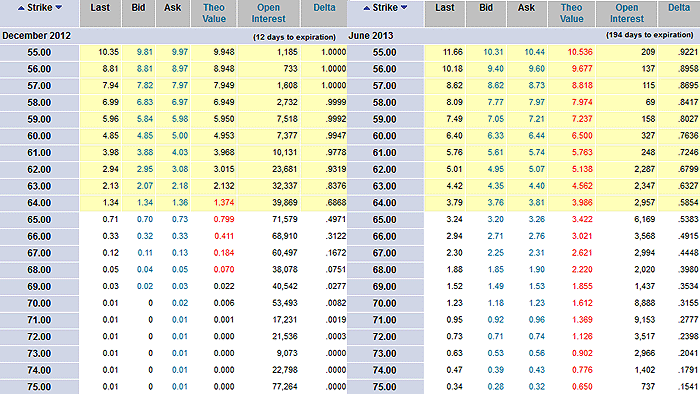
"Do Near Term or Long Term Options Move More?"
"If one buys an option on a stock and the stock price goes up would the option price move up more if its expiry date was near-dated or longer-dated or would the option appreciaton be the same? I am only considering option to stock price movement ratio and not factoring in any time decay of the option. In other words does buying extra time for your option play end up costing you anything except the time decay? Thanks"- Asked By Smokey on 7 Dec 2012
Answered by Mr. OppiE
Hi Smokey,
This is a very common question I get from options trading beginners who have yet to understand fully the mechanics of how options prices move; the Greeks.
The theoretical rate of change of an option's price to changes in the price of its underlying stock is governed by the options greek called "Delta". A option of 0.5 delta is expected to appreciate by $0.50 with every $1 appreciation in price of the underlying stock. This is what you are referring to in your question as the "option to stock price movement ratio". So, does nearer term option or longer term option has a higher "Delta"?
One of the characteristics of Delta is that the nearer the expiration, the higher the delta tends to be for in the money options and lower for out of the money options. This is due to the fact that delta also suggests the probability of an option ending in the money by expiration. The nearer the expiration date, the higher the probability that an in the money option will expire in the money and an out of the money option will expire out of the money.

The picture above is the delta values of December and June QQQ call options across different strike prices. As you can see above, an in the money call option such as the December $60 Call has delta of .9947 while the June $60 Call has a delta of only .7636. This means that if you buy the Dec60Call and QQQ goes up by $1, you make $0.9947 while if you bought the Jun60Call, you would make only $0.7636 on the same move. However, if you look at an out of the money call option such as the December $68 Call, it has a delta value of only .0751 while the June $68 Call has a delta value of .3980! This means that the June $68 Call would make about 6 times more profit than the December $68 Call on the same move.
In conclusion, whether you get more or less delta for longer term options depends on whether you are buying in the money or out of the money options. The more in the money you buy longer term options, the lower the delta and therefore the lower the expected profit and the more out of the money you buy longer term options, the higher the delta and therefore the higher the expected profit.
Important Disclaimer : Options involve risk and are not suitable for all investors. Data and information is provided for informational purposes only, and is not intended for trading purposes. Neither www.optiontradingpedia.com, mastersoequity.com nor any of its data or content providers shall be liable for any errors, omissions, or delays in the content, or for any actions taken in reliance thereon. Data is deemed accurate but is not warranted or guaranteed. optiontradinpedia.com and mastersoequity.com are not a registered broker-dealer and does not endorse or recommend the services of any brokerage company. The brokerage company you select is solely responsible for its services to you. By accessing, viewing, or using this site in any way, you agree to be bound by the above conditions and disclaimers found on this site.
Copyright Warning : All contents and information presented here in www.optiontradingpedia.com are property of www.Optiontradingpedia.com and are not to be copied, redistributed or downloaded in any ways unless in accordance with our quoting policy. We have a comprehensive system to detect plagiarism and will take legal action against any individuals, websites or companies involved. We Take Our Copyright VERY Seriously!
Site Authored by